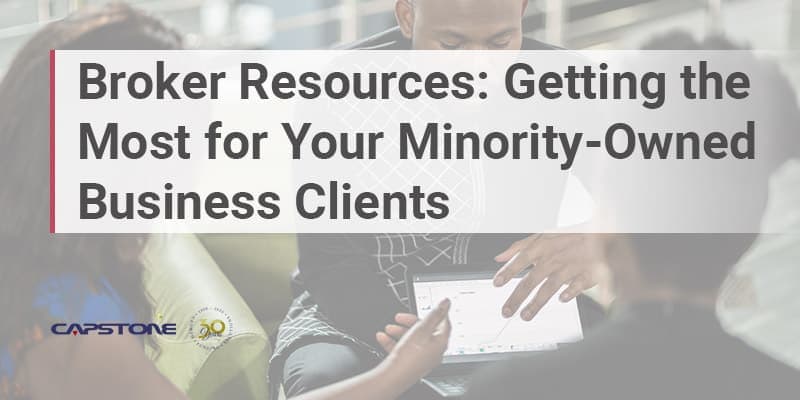If you have a client that is a minority-owned small business, you may have learned the hard way that equal opportunity may not always apply to ease of access for business funding options. Minority-owned small businesses, also known as Minority Business Enterprises (MBEs), grew by 79% between 2007 and 2017, to approximately 11.1 million businesses, about 10 times faster than the overall growth rate for U.S. small businesses during the same time period.
Despite the rapid growth and significance of MBEs in the U.S. economy, these business owners continue to have more difficulty accessing traditional financing, capital, and other resources for their small businesses. MBEs are much less likely to be approved for small business loans than businesses that are not minority-owned, and if they are approved for financing, MBEs are more likely to receive lower amounts and higher interest rates. This can be due to a few reasons, including lower net worth, lack of assets, a business located in an underserved area, weaker credit history, and other tangible or intangible barriers.
In this article, we’ll cover a few organizations and resources that can help your MBE clients obtain the assistance they need to grow and prosper and discuss why alternative business funding may be the right solution to their working capital needs.
Resources and Funding Alternatives
Some resources and funding alternatives available to MBEs come from a variety of sources in a number of forms, including:
Federal Resources
Minority Business Development Agency (MBDA) – This agency was created to encourage the creation and growth of MBEs.
The Small Business Administration (SBA) – The SBA is an agency of the Federal Government and one of the largest loan guarantors in the U.S. They offer several programs aimed at helping small businesses, including the SBA 8(a) Business Development Program and SBA 7(A) loans. SBA 7 (a) loans are the most common type of SBA loan. They are low-cost loans of $5 million that can be used for working capital, equipment purchases, etc.
Another SBA loan program is the Community Advantage (CA). Community Advance is a pilot loan program that is designed to meet the needs of businesses in underserved communities that may not meet the requirements for a traditional loan. Loans range up to $250,000 from lenders such as community organizations, certified development companies, microloan program intermediaries, as well as nonprofits. The SBA guarantees loans up to 85% of the amount.
Grants and other Federal Assistance – There are many government grant programs available for MBEs to take advantage of. They include:
- Grants.gov
- USDA Rural Business Development Grants
- The Coalition to Back Black Businesses
- USDA Water & Waste Disposal Loan and Grant Program
- Minority Business Development Agency
Local Government Centers
Many states and cities have business programs and centers with minority-oriented financial education and networking programs.
Minority-Owned Small Business Associations and Organization
Asian Business Association (ABA) – organization representing divergent groups of Asian American business owners that offers business training and education to its members.
Black Business Association (BBA) – advocacy organization that offers networking and procurement resources to Black-owned businesses.
National Hispanic Business Group (NHBG) – association that provides networking and business opportunities to its Hispanic members.
Private sources such as ACCION, a microfinance organization that supports Hispanic and other MBEs through micro-loans of up to $50,000.
Alternative Financial Resources for Long-term Success
Commercial loans and revolving lines of credit from banks or other traditional lenders may not be an option for MBEs because they lack the assets required for collateral, have limited or poor credit history, and often may be located in underserved communities.
Therefore some MBEs may seek out financing through friends and family. They may even feel pressured to reach out to private investors and offer a piece of equity in their business or seek business funding through hard money lenders, credit card advances, and merchant cash advances (MCAs). These options may be available to the business owner but, in the long-run, could potentially damage the business financially as they typically come with high-interest rates and create a never-ending cycle of debt.
There are other options that MBE business owners can consider including invoice factoring and purchase order (PO) financing. Both have the potential to provide working capital on relatively short notice. The conversion of accounts receivable into immediate cash flow through invoice factoring makes sense for MBEs from a practical point of view. Here are some reasons why:
- No new debt on their balance sheet
- No need to give up equity in the business
- Personal liability is limited
- The MBE business owner retains control and flexibility – can factor all their invoices or only specific ones
- The fastest method of obtaining working capital for immediate business needs
- Approval is based primarily on the financial strength of the MBE’s customers, not the credit profile of the client
While traditional financial institutions prefer to lend to businesses with only positive financial performance, stable cash flows, and predictable revenues, invoice factoring companies, such as Capstone, can often work beyond these issues and provide funding based on the quality and strength of a business owner’s accounts receivable. The approval process is simpler and faster than the underwriting process at a bank or traditional lender.
Financial brokers/ISOs can help their MBE clients to grow and prosper by making them aware of the other resources and funding alternatives available to them including solutions through Capstone. Capstone is a leader in customizing business funding plans for businesses in wide range of industries to help them meet their working capital needs. For more information on how to join Capstone as a broker and referral partner, call us at (212)-755-3636.




